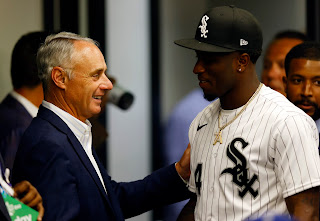Major League Baseball and the MLB Players Association failed to come to terms on any agreement on a new collective bargaining agreement, and as expected the League locked out its players at midnight, Thursday, December 2.
It marks the first lockout in Major League Baseball since 1990, and first work stoppage since the player strike canceled the remainder of the 1994 season, and delayed the start of the '95 season. That work stoppage lasted 232 days. The longest work stoppage of the four major sports in the United States is the NHL, 310 days, which whipped out the entire 2004-05 season.
Commissioner Rob Manfred said in a prepared statement:"It was the owners' choice, plain and simple, specifically calculated to pressure Players into relinquishing rights and benefits, and abandoning good faith bargaining proposals that will benefit not Just Players, but the game and industry as a whole," the MLBPA said in its statement. "These tactics are not new. We have been here before, and Players have risen to the occasion time and again -- guided by a solidarity that has been forged over generations. We will do so again here.
"We remain determined to return to the field under the terms of a negotiated collective bargaining agreement that is fair to all parties, and provides fans with the best version of the game we all love."
In response the players union posted a statement to Twitter saying, "This shutdown is a dramatic measure, regardless oft timing. It is not required by law or any other reason. It was the owner's choice, plain and simple, specifically calculated to pressure players into relinquishing rights and benefits, and abandoning good faith bargaining proposals that will benefit not just players, but the game and industry as a whole."
Typically lockouts are met with panic from players to owners and fans. So far that panic hasn't hit a fever pitch, yet. It will increase the longer the work stoppage is in place.
According to ESPN's Jeff Passan: "The next 90 or so days, sources said, will serve as a more realistic runway for a deal than the lead-up to the expiration of the agreement that covered the 2017 through 2021 seasons. The three previous lockouts did not result in any regular-season games missed, and if the league and union want the same to be the case in 2022, the latest they can strike a deal is early March."
Both sides have been stuck on increased revenue for players, changes in the dynamics of free agency, and expansion to postseason play to name a few.
"We hope that the lockout will jumpstart the negotiations and get us to an agreement that will allow the season to start on time," Manfred said in his statement. "This defensive lockout was necessary because the Players Association's vision for Major League Baseball would threaten the ability of most teams to be competitive. It's simply not a viable option. From the beginning, the MLBPA has been unwilling to move from their starting position, compromise, or collaborate on solutions."
Before the lockout, teams were busy singing players to mega contracts. The Mets were busy signing a quartet of players including Max Scherzer (three-years, $130 million) and Starling Marte (four-years, $78 million). The Yankees were unusually quiet leading into the lockout. Many thought they would be in the market for a shortstop, however free agent Corey Seager signed a 10-year, $325 million deal with Texas, and Javier Baez inked a six-year, $140 million deal in Detroit.
Notable free agents like Carlos Correa and Kris Bryant did not sign contracts with any team, and cannot sign anywhere until the labor freeze is settled.

Comments